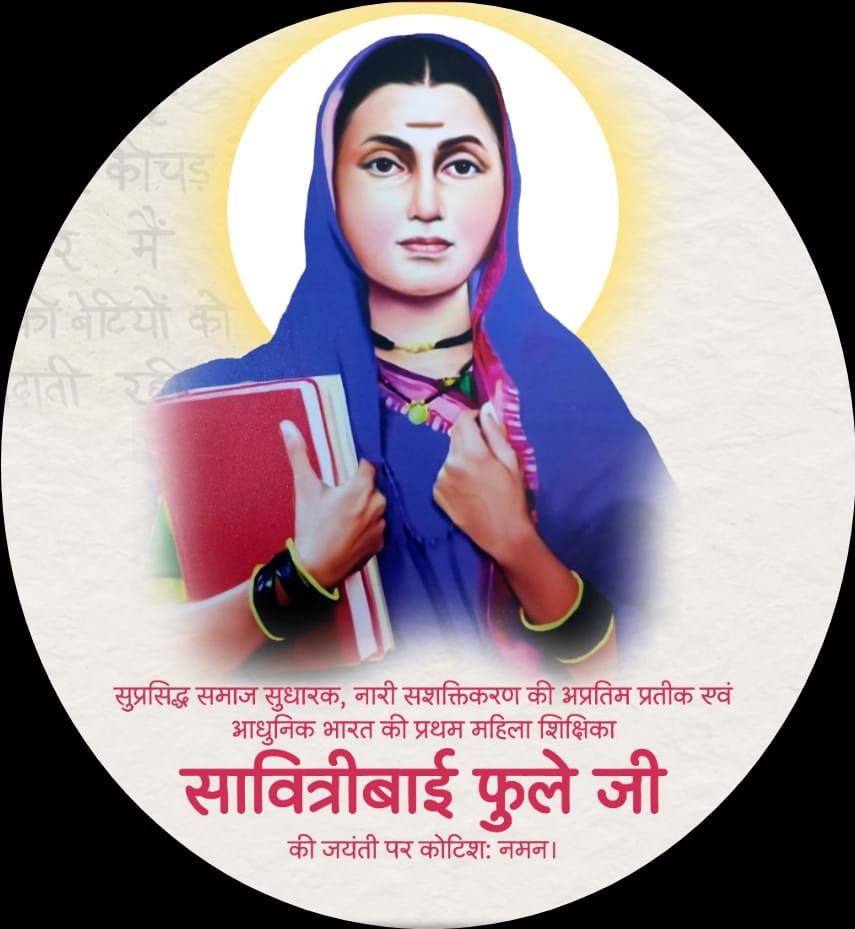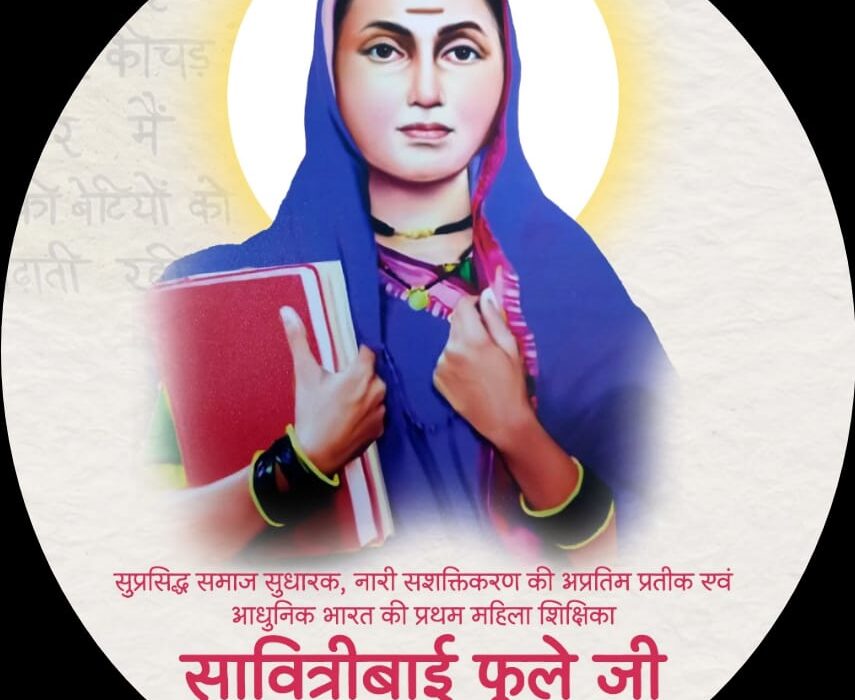Savitribai Phule Birth Anniversary
Magha Krishna Paksha, Panchami, 1887 Vikram Samvat
(3 January 1831)
Savitribai Phule will always be remembered for her extra ordinary zeal in the field of women education. She fought for the cause against heavy odds and had to suffer hardships. However, nothing could stop her.
Savitribai Phule is considered as the pioneer of women education of modern India. She opened the first school exclusively for women in Pune in 1848. She was the wife of Mahatma Jyotiba Phule, who is also known as one of the greatest social reformers of 19th century and continues to inspire today. Savitribai’s entire life was devoted to the cause of her husband’s mission, which was mainly concerned with eradication of caste discrimination and establishing equality. She carried out her mission despite heavy resistance by orthodox people and even physical attacks.
Childhood – Savitribai was born in Naigaon village of Satara district in Maharashtra on January 3, 1831. Her father was Khandoji Newse-Patil while mother’s name was Laxmibai. Savitribai was born and brought up in a village, where education for women was beyond imagination. Naygaon was a very small village and her father was head of the village.
Marriage – Savitribai’s life was drastically changed when she gfot married with Jyotiba in 1840. She was hardly nine-year-old while Jytotiba was 13-year-old at the time of marriage. Jyotiba had undergone severe hardships because of caste discrimination, outdated traditions, rituals and social exploitation since childhood. Jyotiba decided to fight against social ills and Savitribai was determined to walk with him despite heavy odds. Her role in Mahatma Jyotiba Phule’s life is immensely important because of which she is known as ‘krantijyoti’ (torchbearer of revolution).
Education for women – While Mahatma Jyotiba Phule was fighting for his mission, Savitribai realized the importance of women’s role in bringing about social change. A majority of the women were double victims that time. Firstly, gender discrimination and secondly caste discrimination. She was of the firm opinion that society cannot be changed unless women’s life was changed. She believed that modern education was the only tool to change the lives of women.
Savitribai opened the first school for girls in Pune in January 1848. Significantly, the school was opened in the area, which was dominated by orthodox people, who were opposed to the idea of women education. However, the person, who offered his property for the purpose, belonged to orthodox Brahmin community. Savitribai is known as the first woman teacher because of bold steps.
Savitribai was tortured, threatened and abused when she opened the school. However, her strong determination to the cause did not deviate from her path. In fact, her idea of women education was gradually accepted by the people as she opened a total of 18 schools in a short span of four years. Her first school – Bhide Wada – is declared as a memorial, which will soon undergo renovation.
Other works – While Savitribai’s life was focused on women education, she worked in other fields, which were directly or indirectly related with social reformation. She challenged the norms of society by opening a home for the prevention of infanticide, offering shelter to widows and allowing her to leave their children for adoption purposes. She strongly fought against child marriage and the Sati tradition, she advocated for the remarriage of widows and raised awareness on many other critical issues.
Maharashtra experienced severe drought in 1876-77 and she is credited for starting relief works for the farmers. The most humanitarian part of drought relief work was shelter for commercial sex workers, who were victims of the drought. She also presided over Satyashodhak Parishad, which was held in Saswad near Pune in 1893. In addition to this, she also penned down her first book of poems – ‘Kavyafule’ in 1854. Later, she wrote three more books – Savitribaichi Gani, Subodh Ratnakar and Bawankashi. Her writings had a great social message.
Devoted wife – Savitribaiwas a traditional devoted wife, whose life was merged with husband. Mahatma Jyotiba Phule suffered from paralysis in July 1887. He was almost bedridden for a period of three years and died on November 28, 1890. Savitribai looked after her husband during this crucial period. This happened when the couple had hardly any well wishers because of their work.
Mahatma Jyotiba Phule’s death was also a big examination for Savitribai. In Maharashtra, a tradition prevailed that time that a person, who carries out certain rituals, was supposed to be legal heir of the deceased person. Jyotiba and Savitribai had adopted a boy – Yashvantrao -. When Yashvantrao came forward to carry out those rituals, he was opposed by family members of the Phule family. Savitribai came forward at that critical moment and carried out all the necessary rituals. In fact, funeral procession was led by Savitribai, which was very unusual at that time. She also performed last rites, which was also very unusual that time. Her sufferings and hardships continued even after Jyotiba’s death. No family in Maharashtra was ready to have any kind of ties with Yashvantrao as he was the adopted son of a widow. However, Dnyanoba Krishnaji Sasane, who was a close fellow of Mahatma Phule came forward and Yashvantrao got married with Dnyanoba’s daughter – Radha.
Death – Pune was gripped with a pandemic of plague in 1897. Savitribai started relief and medical assistance work for plague patients. Plague was considered a fatal disease that time. Savitribai was caught up with plague while serving plague patients. She breathed her last on March 10, 1897.
Her life was full of struggle but she never got deviated from her path. Despite severe resistance, she continued her social mission with great courage to bring about social reforms.




Leave feedback about this